Primary Care Knowledge Boost
All things General Practice! Join doctors Sara and Lisa as they interview specialists from around Greater Manchester with the aim of improving the confidence and knowledge of local primary care clinicians. The podcast has been made possible due to the support of Wigan CCG and GP Excellence in Greater Manchester.
Episodes
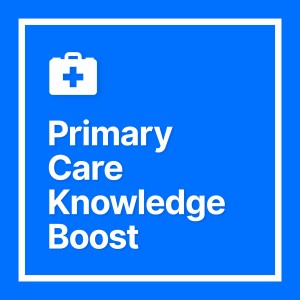
Wednesday Sep 16, 2020
Wednesday Sep 16, 2020
Managing the common palliative symptoms of nausea, vomiting and constipation can make a world of difference to the quality of life of our patients. This week, Lisa and Sara are joined again by Drs Liam Hosie and Anna Murray to continue their discussion about managing palliative patients in general practice.
We cover important features in a history that point to the cause of symptoms for nausea/vomiting and constipation. The causes of nausea and vomiting are then broken down to four categories and we consider what medications might work best for these. We go on to discuss managing constipation and point to a helpful guide for further reference.
Useful resources:
Greater Manchester Medicines Management Group, Palliative Care Pain and Symptom Control for Adults (Fifth Edition, Nov 2019): http://gmmmg.nhs.uk/docs/guidance/GMMMG-Palliative-Care-Pain-and-Symptom-Control-Guidelines-for-Adults-v1-1.pdf#search=%22nausea%22
NICE Clinical Knowledge Summaries, Palliative Care - Nausea and Vomiting: https://cks.nice.org.uk/topics/palliative-care-nausea-vomiting/
NICE Clinical Knowledge Summaries, Palliative Care - Constipation: https://cks.nice.org.uk/topics/palliative-care-constipation/
Wigan & Leigh Hospice Symptom Management Guidelines for the Care of Adults in the Last Hours or Days of Life (Community Version 3): https://d2abk28tx5gxte.cloudfront.net/app/uploads/2018/11/26165005/symptom_management_guidance_end_of_life_adults_community_v3.pdf
___
We really want to make these episodes relevant and helpful: if you have any questions or want any particular areas covered then contact us on Twitter @PCKBpodcast, or leave a comment on our really quick anonymous survey here: https://www.surveymonkey.co.uk/r/YLN6GKT
___
This podcast has been made with the support of GP Excellence and Wigan CCG. Given that it is recorded with Greater Manchester clinicians, the information discussed may not be applicable elsewhere and it is important to consult local guidelines before making any treatment decisions.
The information presented is the personal opinion of the healthcare professional interviewed and might not be representative to all clinicians. It is based on their interpretation of current best practice and guidelines when the episode was recorded. Guidelines can change; To the best of our knowledge the information in this episode is up to date as of it’s release but it is the listeners responsibility to review the information and make sure it is still up to date when they listen.
Dr Lisa Adams, Dr Sara MacDermott and their interviewees are not liable for any advice, investigations, course of treatment, diagnosis or any other information, services or products listeners might pursue as a result of listening to this podcast - it is the clinicians responsibility to appraise the information given and review local and national guidelines before making treatment decisions. Reliance on information provided in this podcast is solely at the listeners risk.
The podcast is designed to be used by trained healthcare professionals for education only. We do not recommend these for patients or the general public and they are not to be used as a method of diagnosis, opinion, treatment or medical advice for the general public. Do not delay seeking medical advice based on the information contained in this podcast. If you have questions regarding your health or feel you may have a medical condition then promptly seek the opinion of a trained healthcare professional.

Wednesday Sep 02, 2020
Wednesday Sep 02, 2020
To help us brush up on managing palliative patients with pain, Lisa and Sara speak to Dr Anna Murray (Palliative Care Specialist, WWL) and GP Lead Dr Liam Hosie (Palliative Care and GP, WWL).
We start with a general approach to pain and then move on to consider the causes, discuss opioid titrations as well as adjuvant therapies. We also touch on agitation and breathlessness and when to consider changing the routes of medication.
Useful resources:
GMMMG Palliative Care Pain and Symptom Control Guidelines for Adults:http://gmmmg.nhs.uk/docs/guidance/GMMMG-Palliative-Care-Pain-and-Symptom-Control-Guidelines-for-Adults-v1-1.pdf
Wigan & Leigh Hospice Symptom Management Guidelines for the Care of Adults in the Last Hours or Days of Life (Community Version 3): https://d2abk28tx5gxte.cloudfront.net/app/uploads/2018/11/26165005/symptom_management_guidance_end_of_life_adults_community_v3.pdf
___
We really want to make these episodes relevant and helpful: if you have any questions or want any particular areas covered then contact us on Twitter @PCKBpodcast, or leave a comment on our really quick anonymous survey here: https://www.surveymonkey.co.uk/r/YLN6GKT
___
This podcast has been made with the support of GP Excellence and Wigan CCG. Given that it is recorded with Greater Manchester clinicians, the information discussed may not be applicable elsewhere and it is important to consult local guidelines before making any treatment decisions.
The information presented is the personal opinion of the healthcare professional interviewed and might not be representative to all clinicians. It is based on their interpretation of current best practice and guidelines when the episode was recorded. Guidelines can change; To the best of our knowledge the information in this episode is up to date as of it’s release but it is the listeners responsibility to review the information and make sure it is still up to date when they listen.
Dr Lisa Adams, Dr Sara MacDermott and their interviewees are not liable for any advice, investigations, course of treatment, diagnosis or any other information, services or products listeners might pursue as a result of listening to this podcast - it is the clinicians responsibility to appraise the information given and review local and national guidelines before making treatment decisions. Reliance on information provided in this podcast is solely at the listeners risk.
The podcast is designed to be used by trained healthcare professionals for education only. We do not recommend these for patients or the general public and they are not to be used as a method of diagnosis, opinion, treatment or medical advice for the general public. Do not delay seeking medical advice based on the information contained in this podcast. If you have questions regarding your health or feel you may have a medical condition then promptly seek the opinion of a trained healthcare professional.

Wednesday Aug 19, 2020
Wednesday Aug 19, 2020
Early diagnosis of cancer is a huge priority in order to try to improve our cancer survival rates in the UK. Lisa and Sara took the opportunity to speak to Dr Sarah Taylor, GP in Fallowfield and Cancer Research UK Cancer Diagnosis Lead for Greater Manchester about this important subject.
It was recorded pre-Covid-19 and so some of the information given about services might have changed in your local area. We thought the general tips about picking up cancer as early as possible were incredibly useful however which is why we decided to release the episode.
We cover why early diagnosis of cancer is a priority for the UK, learning points/common themes picked up from significant events in delayed cancer diagnosis, tools that we can use in primary care to help our pick up rate and useful resources for primary care.
Useful resources:
Gateway C: https://www.gatewayc.org.uk/
Cancer Research UK Health Professional Section: https://www.cancerresearchuk.org/health-professional
Macmillan Health Professional Resources: https://www.macmillan.org.uk/about-us/health-professionals/resources
QCancer Score: https://www.qcancer.org/
Cancer Research UK Facilitator Programme: https://www.cancerresearchuk.org/health-professional/learning-and-support/about-our-partnerships/what-is-the-facilitator-programme
NICE Suspected cancer - recognition and referral: https://www.nice.org.uk/guidance/ng12
BJGP - Improving early diagnosis of cancer in UK general practice: https://bjgp.org/content/67/659/276
___
We really want to make these episodes relevant and helpful: if you have any questions or want any particular areas covered then contact us on Twitter @PCKBpodcast, or leave a comment on our really quick anonymous survey here: https://www.surveymonkey.co.uk/r/YLN6GKT
___
This podcast has been made with the support of GP Excellence and Wigan CCG. Given that it is recorded with Greater Manchester clinicians, the information discussed may not be applicable elsewhere and it is important to consult local guidelines before making any treatment decisions.
The information presented is the personal opinion of the healthcare professional interviewed and might not be representative to all clinicians. It is based on their interpretation of current best practice and guidelines when the episode was recorded. Guidelines can change; To the best of our knowledge the information in this episode is up to date as of it’s release but it is the listeners responsibility to review the information and make sure it is still up to date when they listen.
Dr Lisa Adams, Dr Sara MacDermott and their interviewees are not liable for any advice, investigations, course of treatment, diagnosis or any other information, services or products listeners might pursue as a result of listening to this podcast - it is the clinicians responsibility to appraise the information given and review local and national guidelines before making treatment decisions. Reliance on information provided in this podcast is solely at the listeners risk.
The podcast is designed to be used by trained healthcare professionals for education only. We do not recommend these for patients or the general public and they are not to be used as a method of diagnosis, opinion, treatment or medical advice for the general public. Do not delay seeking medical advice based on the information contained in this podcast. If you have questions regarding your health or feel you may have a medical condition then promptly seek the opinion of a trained healthcare professional.
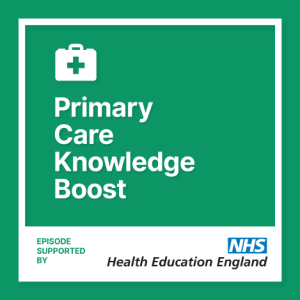
Wednesday Aug 05, 2020
Wednesday Aug 05, 2020
Good consultation skills can hone diagnosis, management plans, safety-netting and safety thereby really affecting patient outcomes. GP and Primary Care Educator Dr Avril Danczak shares her insights into teaching GP trainees and trainers about consultation skills with Lisa and Sara.
Useful resources:
Health Education North West Advanced Communication Skills Resources https://www.nwpgmd.nhs.uk/resources/advanced-communication-skills-reading-list
Article: Kaiser Permanente: Enhancing Clinician Communication Skills in a Large Healthcare Organization: A longitudinal Case Studyhttps://www.sciencedirect.com/science/article/abs/pii/S0738399105000133
Book: Silverman, Kurtz and Draper: Skills for Communicating with Patientshttps://www.amazon.co.uk/Skills-Communicating-Patients-Jonathan-Silverman/dp/1846193656/ref=pd_rhf_se_p_img_2?_encoding=UTF8&psc=1&refRID=T0WVKH6Y145JAJ1VDHCJ
Book: Platt and Gordon: Field Guide to the Difficult Patient Interviewhttps://www.amazon.co.uk/Field-Guide-Difficult-Patient-Interview/dp/0781747740
Book: Barry Bub MD: Communication Skills That Healhttps://www.amazon.co.uk/Communication-Skills-That-Heal-Professionalism/dp/1857756649
___
We really want to make these episodes relevant and helpful: if you have any questions or want any particular areas covered then contact us on Twitter @PCKBpodcast, or leave a comment on our really quick anonymous survey here: https://www.surveymonkey.co.uk/r/YLN6GKT
___
This episode has been made with the support of Health Education North West. Given that they are recorded with Greater Manchester clinicians, the information discussed may not be applicable elsewhere and it is important to consult local guidelines before making any treatment decisions.
The information presented is the personal opinion of the healthcare professional interviewed and might not be representative to all clinicians. It is based on their interpretation of current best practice and guidelines when the episode was recorded. Guidelines can change; To the best of our knowledge the information in this episode is up to date as of it’s release but it is the listeners responsibility to review the information and make sure it is still up to date when they listen.
Dr Lisa Adams, Dr Sara MacDermott and their interviewees are not liable for any advice, investigations, course of treatment, diagnosis or any other information, services or products listeners might pursue as a result of listening to this podcast - it is the clinicians responsibility to appraise the information given and review local and national guidelines before making treatment decisions. Reliance on information provided in this podcast is solely at the listeners risk.
The podcast is designed to be used by trained healthcare professionals for education only. We do not recommend these for patients or the general public and they are not to be used as a method of diagnosis, opinion, treatment or medical advice for the general public. Do not delay seeking medical advice based on the information contained in this podcast. If you have questions regarding your health or feel you may have a medical condition then promptly seek the opinion of a trained healthcare professional.

Wednesday Jul 22, 2020
Wednesday Jul 22, 2020
As part of her role as Associate Dean in Health Education North West, Dr Alison Caldwell looks after GP trainees who sit the AKT and those that may fail. In this episode she shares her pearls of wisdom for preparing and sitting the AKT.
It has lots of useful information for trainees and trainers including how to break down the curriculum and where to best focus learning as well as how to actually do that learning effectively. We also cover how to improve exam technique as well as useful resources and specific advice for those who have tried and failed the exam.
____
Useful resources:
Fourteen Fish for GP Trainees: https://www.fourteenfish.com/audience/gptrainee
RCGP - MRCGP Applied Knowledge Test (AKT): https://www.rcgp.org.uk/training-exams/mrcgp-exam-overview/mrcgp-applied-knowledge-test-akt.aspx
RCGP- GP Curriculum Overview: https://www.rcgp.org.uk/training-exams/training/gp-curriculum-overview.aspx
BNF Online: https://bnf.nice.org.uk/
RCGP - Clinical evidence and data interpretation: https://www.rcgp.org.uk/training-exams/mrcgp-exam-overview/-/media/B4406D5D2E9A492B86AD74BC3FEFD08B.ashx
Bolton GP scheme - Medical statistics: https://gp-training.hee.nhs.uk/bolton/mrcgp-examinations/
General Practice Education in Health Education England working across the North West: https://www.nwpgmd.nhs.uk/general-practice-education-north-western-deanery
____
We really want to make these episodes relevant and helpful: if you have any questions or want any particular areas covered then contact us on Twitter @PCKBpodcast, or leave a comment on our really quick anonymous survey here: https://www.surveymonkey.co.uk/r/YLN6GKT
____
This episode has been made with the support of Health Education North West. Given that they are recorded with Greater Manchester clinicians, the information discussed may not be applicable elsewhere and it is important to consult local guidelines before making any treatment decisions.
The information presented is the personal opinion of the healthcare professional interviewed and might not be representative to all clinicians. It is based on their interpretation of current best practice and guidelines when the episode was recorded. Guidelines can change; To the best of our knowledge the information in this episode is up to date as of it’s release but it is the listeners responsibility to review the information and make sure it is still up to date when they listen.
Dr Lisa Adams, Dr Sara MacDermott and their interviewees are not liable for any advice, investigations, course of treatment, diagnosis or any other information, services or products listeners might pursue as a result of listening to this podcast - it is the clinicians responsibility to appraise the information given and review local and national guidelines before making treatment decisions. Reliance on information provided in this podcast is solely at the listeners risk.
The podcast is designed to be used by trained healthcare professionals for education only. We do not recommend these for patients or the general public and they are not to be used as a method of diagnosis, opinion, treatment or medical advice for the general public. Do not delay seeking medical advice based on the information contained in this podcast. If you have questions regarding your health or feel you may have a medical condition then promptly seek the opinion of a trained healthcare professional.
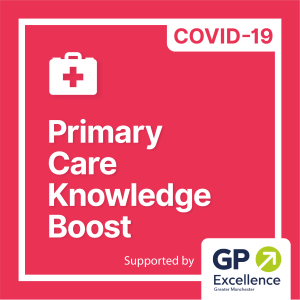
Wednesday Jul 08, 2020
Wednesday Jul 08, 2020
Lisa and Sara bring back Dr Joanna Bircher and Dr Viren Mehta for this last episode in the COVID-19 series to reflect on all of the positives that have come from the outbreak in general practice, the personal and professional learning that they have had and some focus on staff wellbeing with a few simple ideas on how to support each other.
Thank you to Practice Managers Sara Mayer at Archwood Medical Practice and Michelle Davenport at Heaton Mersey Medical Practice for sharing their insights too.
____
Useful resources:
Headspace - information about free NHS access: https://help.headspace.com/hc/en-us/articles/360044971154-Headspace-for-the-NHS
Looking After You Too coaching: https://people.nhs.uk/lookingafteryoutoo/
NHS Practitioner Health programme: https://www.practitionerhealth.nhs.uk/accessing-the-service
RCGP Wellbeing Resources: https://www.rcgp.org.uk/training-exams/practice/gp-wellbeing.aspx
____
We really want to make these episodes relevant and helpful: if you have any questions or want any particular areas covered then contact us on Twitter @PCKBpodcast, or leave a comment on our really quick anonymous survey here: https://www.surveymonkey.co.uk/r/YYQ763C
____
This podcast has been made with the support of Wigan CCG and GP Excellence in Greater Manchester. Given that they are recorded with Greater Manchester clinicians, the information discussed may not be applicable elsewhere and it is important to consult local guidelines before making any treatment decisions.
The information presented is the personal opinion of the healthcare professional interviewed and might not be representative to all clinicians. It is based on their interpretation of current best practice and guidelines when the episode was recorded. Guidelines can change; To the best of our knowledge the information in this episode is up to date as of it’s release but it is the listeners responsibility to review the information and make sure it is still up to date when they listen.
Dr Lisa Adams, Dr Sara MacDermott and their interviewees are not liable for any advice, investigations, course of treatment, diagnosis or any other information, services or products listeners might pursue as a result of listening to this podcast - it is the clinicians responsibility to appraise the information given and review local and national guidelines before making treatment decisions. Reliance on information provided in this podcast is solely at the listeners risk.
The podcast is designed to be used by trained healthcare professionals for education only. We do not recommend these for patients or the general public and they are not to be used as a method of diagnosis, opinion, treatment or medical advice for the general public. Do not delay seeking medical advice based on the information contained in this podcast. If you have questions regarding your health or feel you may have a medical condition then promptly seek the opinion of a trained healthcare professional.

Wednesday Jul 01, 2020
Wednesday Jul 01, 2020
Now that the Greater Manchester Enabling Safe Certification of Death in the Community service is being stood down, we take the opportunity to talk through the new legislation (from the Coronavirus Act 2020) and how this applies in practice.
Dr Aamna Khan (GP and Clinical Lead for the Enabling Safe Certification of Death in the community service) and Dr Viren Mehta (GP partner, clinical director of his PCN and clinical director for Stockport CCG) take us through this important subject.
They discuss:
Expected and unexpected deaths and how these should be approached
Who should be referred to the coroner and when to write COVID-19 on the death certificate
Verification of death and who can do this
Who can complete paperwork such as the death certificate and cremation forms and the criteria that now needs to be satisfied to enable this to be done
Tips on how to complete this paperwork at the moment
The ways in which the registration process has changed
Thoughts on how practices and PCNs can think about their systems to make death in the community safer and smoother for everyone involved
____
Useful resources:
Information and contact details for Greater Manchester Enabling Safe Certification of Deaths in the Community Service: https://gmprimarycare.org.uk/coronavirus/
Coronavirus Act 2020: http://www.legislation.gov.uk/ukpga/2020/7/contents/enacted
Red Whale - COVID-19: Death in the community: https://www.gp-update.co.uk/SM4/Mutable/Uploads/pdf_file/28_GP_COVID-19_The-Coronovirus-Act-2020-Death-certification,-cremation-and-burial.pdf
____
We really want to make these episodes relevant and helpful: if you have any questions or want any particular areas covered then contact us on Twitter @PCKBpodcast, or leave a comment on our really quick anonymous survey here: https://www.surveymonkey.co.uk/r/YYQ763C
____
This podcast has been made with the support of Wigan CCG and GP Excellence in Greater Manchester. Given that they are recorded with Greater Manchester clinicians, the information discussed may not be applicable elsewhere and it is important to consult local guidelines before making any treatment decisions.
The information presented is the personal opinion of the healthcare professional interviewed and might not be representative to all clinicians. It is based on their interpretation of current best practice and guidelines when the episode was recorded. Guidelines can change; To the best of our knowledge the information in this episode is up to date as of it’s release but it is the listeners responsibility to review the information and make sure it is still up to date when they listen.
Dr Lisa Adams, Dr Sara MacDermott and their interviewees are not liable for any advice, investigations, course of treatment, diagnosis or any other information, services or products listeners might pursue as a result of listening to this podcast - it is the clinicians responsibility to appraise the information given and review local and national guidelines before making treatment decisions. Reliance on information provided in this podcast is solely at the listeners risk.
The podcast is designed to be used by trained healthcare professionals for education only. We do not recommend these for patients or the general public and they are not to be used as a method of diagnosis, opinion, treatment or medical advice for the general public. Do not delay seeking medical advice based on the information contained in this podcast. If you have questions regarding your health or feel you may have a medical condition then promptly seek the opinion of a trained healthcare professional.
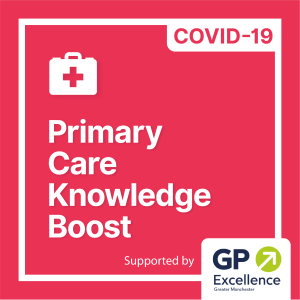
Wednesday Jun 24, 2020
Wednesday Jun 24, 2020
At the moment with increased isolation, anxiety and loneliness, social prescribing has become more important than ever.
Sara and Lisa speak to GP Dr Jaweeda Idoo (clinical champion for personalised care in Greater Manchester) and Sophie Glinka (social prescribing lead for people and communities in Greater Manchester) about the role of social prescribing during COVID-19 and indeed in general.They talk about some case studies where social prescribing has been invaluable to the care and support of patients, and showcase the importance of this facet of community care.
____
Useful resources:
The Health Foundation - What makes us healthy? An introduction to the social determinants of health (2018): https://www.health.org.uk/sites/default/files/What-makes-us-healthy-quick-guide.pdf
International Journal of Epidemiology - Sick individuals and sick populations (2001): https://academic.oup.com/ije/article/30/3/427/736897
Proceedings of the National Academy of Sciences of the United States of America - Social isolation, loneliness, and all-cause mortality in older men and women (2013): https://www.pnas.org/content/110/15/5797.short
____
We really want to make these episodes relevant and helpful: if you have any questions or want any particular areas covered then contact us on Twitter @PCKBpodcast, or leave a comment on our really quick anonymous survey here: https://www.surveymonkey.co.uk/r/YYQ763C
____
This podcast has been made with the support of Wigan CCG and GP Excellence in Greater Manchester. Given that they are recorded with Greater Manchester clinicians, the information discussed may not be applicable elsewhere and it is important to consult local guidelines before making any treatment decisions.
The information presented is the personal opinion of the healthcare professional interviewed and might not be representative to all clinicians. It is based on their interpretation of current best practice and guidelines when the episode was recorded. Guidelines can change; To the best of our knowledge the information in this episode is up to date as of it’s release but it is the listeners responsibility to review the information and make sure it is still up to date when they listen.
Dr Lisa Adams, Dr Sara MacDermott and their interviewees are not liable for any advice, investigations, course of treatment, diagnosis or any other information, services or products listeners might pursue as a result of listening to this podcast - it is the clinicians responsibility to appraise the information given and review local and national guidelines before making treatment decisions. Reliance on information provided in this podcast is solely at the listeners risk.
The podcast is designed to be used by trained healthcare professionals for education only. We do not recommend these for patients or the general public and they are not to be used as a method of diagnosis, opinion, treatment or medical advice for the general public. Do not delay seeking medical advice based on the information contained in this podcast. If you have questions regarding your health or feel you may have a medical condition then promptly seek the opinion of a trained healthcare professional.

Wednesday Jun 17, 2020
Wednesday Jun 17, 2020
Staff risk assessments in primary care during COVID-19 are generating many questions such as;
Which tool?
How should they be carried out?
What are the advantages and disadvantages of doing them?
How does Vitamin D fit in?
What does this mean for practice?
GPs Sara and Lisa talk to Greater Manchester based GP Dr Jaweeda Idoo and Practice manager Gina Bird about their experiences of staff risk assessments in general practice at the moment.
____
Useful resources:
BMJ Covid-19: Known risk factors fail to explain the increased risk of death among people from ethnic minorities May 2020: https://www.bmj.com/content/369/bmj.m1873
NHS Staff Risk Assessments: https://www.nhsemployers.org/covid19/health-safety-and-wellbeing/risk-assessments-for-staff
SAAD Risk Assessment: https://abmacademy.com/saad-risk-scoring-for-bame/
Welsh Risk Assessment Tool COVID-19 (WRATC): https://www.bapio.co.uk/wp-content/uploads/2020/05/Risk-Assessment-Tool.pdf
RCOG Covid-19 Advice in Pregnancy: https://www.rcog.org.uk/en/guidelines-research-services/guidelines/coronavirus-pregnancy/
____
We really want to make these episodes relevant and helpful: if you have any questions or want any particular areas covered then contact us on Twitter @PCKBpodcast, or leave a comment on our really quick anonymous survey here: https://www.surveymonkey.co.uk/r/YYQ763C
____
This podcast has been made with the support of Wigan CCG and GP Excellence in Greater Manchester. Given that they are recorded with Greater Manchester clinicians, the information discussed may not be applicable elsewhere and it is important to consult local guidelines before making any treatment decisions.
The information presented is the personal opinion of the healthcare professional interviewed and might not be representative to all clinicians. It is based on their interpretation of current best practice and guidelines when the episode was recorded. Guidelines can change; To the best of our knowledge the information in this episode is up to date as of it’s release but it is the listeners responsibility to review the information and make sure it is still up to date when they listen.
Dr Lisa Adams, Dr Sara MacDermott and their interviewees are not liable for any advice, investigations, course of treatment, diagnosis or any other information, services or products listeners might pursue as a result of listening to this podcast - it is the clinicians responsibility to appraise the information given and review local and national guidelines before making treatment decisions. Reliance on information provided in this podcast is solely at the listeners risk.
The podcast is designed to be used by trained healthcare professionals for education only. We do not recommend these for patients or the general public and they are not to be used as a method of diagnosis, opinion, treatment or medical advice for the general public. Do not delay seeking medical advice based on the information contained in this podcast. If you have questions regarding your health or feel you may have a medical condition then promptly seek the opinion of a trained healthcare professional.
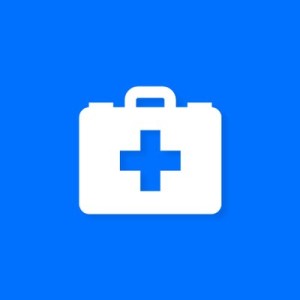
Wednesday Jun 03, 2020
Wednesday Jun 03, 2020
Recorded in January 2020, this is the long awaited second part of Lisa and Sara’s conversation with Professor Anthony Jones and Consultant Physiotherapist William Gregory from Salford Royal Foundation Trust. In Part 1 we covered diagnosis and in Part 2 we look at management of fibromyalgia including:
The role of targeted CBT and physiotherapy
Groups for patient education and support
The role of medications
Where secondary care fits in
Research in the area
The place alternative therapies occupy for some with this condition
Natural progression and associated conditions
Helpful resources for patients and practitioners
____
Useful resources:
Fibromyalgia Action (FMA) UK website (for patient info and list of local support groups): http://www.fmauk.org/
Versus Arthritis booklet: https://www.versusarthritis.org/about-arthritis/conditions/fibromyalgia/
Pain toolkit: https://www.paintoolkit.org/
Living well with pain: https://livewellwithpain.co.uk/
Moving Medicine: https://movingmedicine.ac.uk/
Theatre Performance for all interested in learning about how the brain works in chronic pain: Pain, the Brain and a little bit of Magic: http://research.bmh.manchester.ac.uk/pain//events/PainTheBrainandabitofMagic
Currently available checklist for Fibromyalgia diagnosis on ACR website: https://www.rheumatology.org/Practice-Quality/Clinical-Support/Criteria/ACR-Endorsed-Criteria
A version of the 2016 ACR checklist (amended from the 2010 version): https://people.clarkson.edu/~lrussek/2016FMS.pdf
____
We really want to make these episodes relevant and helpful: if you have any questions or want any particular areas covered then contact us on Twitter @PCKBpodcast, or make our day and fill out our really quick anonymous survey here: https://www.surveymonkey.co.uk/r/YYQ763C
____
This podcast has been made with the support of Wigan CCG and GP Excellence in Greater Manchester. Given that they are recorded with Greater Manchester clinicians, the information discussed may not be applicable elsewhere and it is important to consult local guidelines before making any treatment decisions.
The information presented is the personal opinion of the healthcare professional interviewed and might not be representative to all clinicians. It is based on their interpretation of current best practice and guidelines when the episode was recorded. Guidelines can change; To the best of our knowledge the information in this episode is up to date as of it’s release but it is the listeners responsibility to review the information and make sure it is still up to date when they listen.
Dr Lisa Adams, Dr Sara MacDermott and their interviewees are not liable for any advice, investigations, course of treatment, diagnosis or any other information, services or products listeners might pursue as a result of listening to this podcast - it is the clinicians responsibility to appraise the information given and review local and national guidelines before making treatment decisions. Reliance on information provided in this podcast is solely at the listeners risk.
The podcast is designed to be used by trained healthcare professionals for education only. We do not recommend these for patients or the general public and they are not to be used as a method of diagnosis, opinion, treatment or medical advice for the general public. Do not delay seeking medical advice based on the information contained in this podcast. If you have questions regarding your health or feel you may have a medical condition then promptly seek the opinion of a trained healthcare professional.


